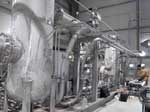
UNH Stands for Sustainability
- By Mike Nicoloro
- Sep 09, 2009

In addition to selling the renewable energy credits (RECs) generated by using landfill gas to help finance the overall cost of the project, UNH purchased a second generator for the cogeneration plant and will sell power in excess of campus needs to the electric grid. UNH will invest REC funds in additional energy efficiency projects on campus.
Credit: Erin Gleason, UNH Photographic Services.
After two years and a $49 million investment, the University of New Hampshire (UNH) in Durham, N.H., has completed its EcoLineTM project and is moving forward on its goal to cut greenhouse gas emissions in half by 2020.
UNH launched the project in September 2007 and completed it in May of this year. The university, the first in the country to depend on landfill gas as its primary fuel source, purchases processed methane from the Turnkey Recycling and Environmental Enterprise (TREE) facility in Rochester, N.H., which is owned and managed by Waste Management Inc. Depending on the quality of the gas, the facility can produce up to 85 percent of the electricity and heat consumed on the university’s 5 million-square-foot campus.
The completion of the EcoLine project is the latest stage in the operation of UNH’s co-generation (co-gen) plant, a $28-million combined heat and power facility that opened three years ago. Facility heat typically lost during the production of electricity warms campus buildings, making more efficient use of the university’s power resources. The process ultimately reduces sulfur dioxide and nitrous oxide emissions. During the first year of operation, the co-gen plant reduced greenhouse gas emissions by an estimated 21 percent in academic year (AY) 2006 over AY 2005.
 A 12.7-mile pipeline brings purified landfill gas from Waste Management's Turnkey Recycling and Environmental Enterprise (TREE) facility in Rochester to the University of New Hampshire campus in Durham, where it will provide up to 85 percent of the university's energy needs.
A 12.7-mile pipeline brings purified landfill gas from Waste Management's Turnkey Recycling and Environmental Enterprise (TREE) facility in Rochester to the University of New Hampshire campus in Durham, where it will provide up to 85 percent of the university's energy needs.
Credit: Perry Smith, UNH Photographic Services.
UNH's investment in the project covers the processing facility at the landfill, 300 extraction wells and a series of collection pipes. The facility uses compression refrigeration and heating and activated charcoal to clean the methane gas of compounds such as siloxanes (typically produced by the breakdown of materials, most notably health and beauty care products). Facility processes then odorize the gas (for leak-detection safety) before it travels 12.7 miles from TREE to UNH through 12-inch diameter, high-density polyethylene piping. The piping system runs underground along the roads of Rochester and Spaulding Turnpike.
The EcoLine project provides UNH with much-needed energy security. Higher fuel costs have contributed to the university's energy costs nearly doubling in the last five years, growing at an annual rate of 18.9 percent. This is due to increasing costs in the commodity and delivery of energy. Using renewable, landfill gas in the co-gen plant will stabilize those costs and ensure the plant has a dependable source of fuel for decades to come. UNH anticipates a payback period of 10 years.
The project is expected to substantially reduce greenhouse gas emissions—67 percent below 2005 levels and 57 percent below 1990 levels. As part of UNH’s climate action plan (WildCAP, see related story below) EcoLine will help the university reach its carbon-neutral goal. Under the plan, UNH has committed to an average 3 percent reduction of greenhouse gas emissions, with reduction goals of 50 percent by 2020 and 80 percent by 2050.
According to the U.S. Environmental Protection Agency, the United States has 3,091 landfills and 560 of these show potential to support a similar project. It’s clear that countless other educational institutions, municipalities, and organizations could benefit from using landfill gas as a primary or supplementary source of power. For years now, landfills have been seen as a necessary evil. Projects like EcoLine could change that perception.
WildCAP
Through its campus-wide Energy Task Force, UNH is developing a climate action plan called "WildCAP." The plan will set goals for UNH to reduce greenhouse gas emissions in fulfillment of the requirements of the American College & University Presidents Climate Commitment. The plan will be developed and in place by November. The goals are to:
- Maximize emissions reductions as soon as possible.
- Maximize cost savings through reduced energy consumption.
- Develop a plan with broad-based support across the UNH community to ensure smooth implementation, willingness to invest in energy saving projects, and participation in energy-saving behavioral changes.
- Maintain UNH’s leadership position in campus climate action.
- Develop opportunities to highlight UNH climate action to internal and external stakeholders and funders.
- Integrate operational and behavior savings efforts with existing or new curricula and research where possible.
About the Author
Michael A. Nicoloro, P.E., (Massachusetts and New Hampshire) is director of Energy Services for S E A Consultants, Inc., which is headquartered in Cambridge, Mass. Nicoloro's focus is in the renewables and natural gas arenas. He has more than 31 years of experience working in plant and process environments.